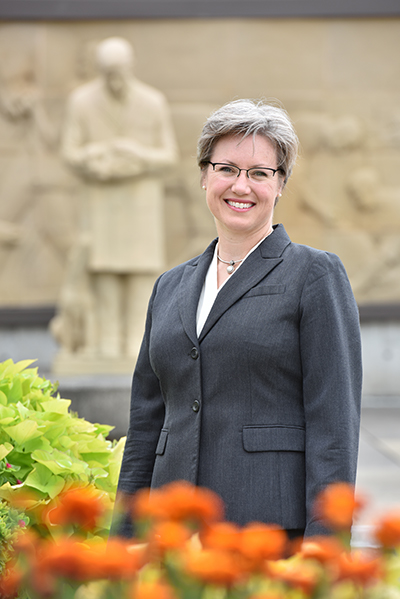
Dr. Amanda Fales-Williams, associate professor of veterinary pathology in the College of Veterinary Medicine, will continue to enhance student learning and teaching with the assistance of a new endowed chair.
Dr. Fales-Williams has been named the inaugural holder of the Tyrone D. Artz, MD, Chair for Teaching Excellence in Veterinary Medicine. The named faculty position was established by Dr. Artz (1941-2015), a former retired orthopaedic surgeon who graduated from Iowa State University in 1964, with a BS in zoology. Although accepted into veterinary school; he ultimately decided go to medical school at the University of Iowa. After a successful career as an orthopaedic surgeon, Dr. Artz chose to recognize both his alma maters with a charitable land gift, opening a pathway for this chair position and several other gifts to the College of Veterinary Medicine and College of Agriculture and Life Sciences at Iowa State University. The intent of Dr. Artz was to further enhance student learning and promote innovative teaching methods.
“I cannot imagine anyone more deserving of holding the first Tyrone D. Artz M.D. Chair for Teaching Excellence in Veterinary Medicine than Dr. Amanda Fales-Williams,” said Dr. Patrick G. Halbur, Dr. Stephen G. Juelsgaard Interim Dean of Veterinary Medicine. “There is no one with more passion for helping students learn and no one more dedicated to continuously innovating and improving her courses and clinical rotations for the benefit of our veterinary students.”
As an academic anatomic pathologist, Dr. Fales-Williams’ day is filled with teaching and teachable moments, whether it’s with veterinary or graduate students in her classes, or veterinarians in the pathology residency training program. And, nearly two decades of teaching experience has taught her a lot. Her philosophy, honed by that experience, is simple: Teaching is like gardening. “You may not see the impact of your work for weeks, months or years,” she says. “You can make the soil just right, ensure the seeds are healthy, water them, but you can only see what’s above the ground.” Then, she explains, you see something come up, and it’s healthy and strong, that’s when you know the root system (what you planted) is intact. “When you see that, the role of an educator is very fulfilling.”
“With the funds that come with the chair position, I’d like to use them to find ways to help students learn efficiently,” she said. Fales-Williams says veterinary students come into a medical curriculum where there’s so much to learn. What students don’t understand is that their learning comes in layers – what they are exposed to in the first year will again be repeated in different ways throughout the curriculum, she explains.
“Teaching the ‘bookends’ of the curriculum – introducing first-year students to foundations of pathology, and working with the fourth-year students in necropsy rotations where they put everything they learned to explain what happened to an animal – is rewarding,” she says. “I get a chance to see how well the students understood the basics (the roots).”
For Fales-Williams, teaching is a passion and striving to teach better is a continuous goal. This includes studying the outcomes of new teaching interventions. Intuitive teaching is rewarding, but must be evaluated with objective data to see if it is actually working.
“I was so stunned by the gift and the loyalty that Dr. Artz had for his undergraduate institution, and his desire to give back to ISU. I’m so proud and humbled to be selected for the chair, and I want his gift to have as much longevity as I can. Developing ways for students to learn more efficiently and helping instructors to structure their classroom innovations in a way to ensure the gift has a lasting impact.”
Dr. Fales-Williams received a BS in zoology from the University of Kentucky (1991), DVM in 1995 from the University of Missouri, and PhD in veterinary pathology from Iowa State in 2000. She is a Diplomate of the American College of Veterinary Pathologists.
September 2017
